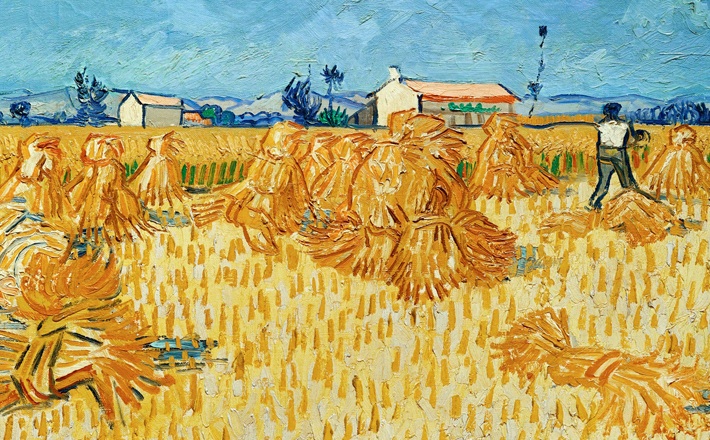Commentary on Isaiah 66:10-14
You know what it’s like to be bone-tired.
It is to be so exhausted, mentally, physically, and spiritually, that the weariness feels like it’s seeped into your very marrow and has become a part of you. It is to feel despairing and defeated. It is to feel as if your energy can never be restored, so you have no choice but to drag yourself through your days, longing all the while only for rest.
We all know that weariness. Fortunately, for most of us, such bone-tiredness, as awful as it is, is only an occasional experience. For some of us, though, it is a way of life. Some of us are so exhausted that bone-tired is the only way we know how to live anymore. Depression, anxiety, marital or family strife, financial instability, ill health — these things and others can make us so crushingly weary that we can’t imagine feeling truly alive again.
The Israelites knew this bone-tiredness, too. In the context of Isaiah 66, the people had suffered through the exile, cut off from their land and from their God. Then, when some were allowed to return in anticipation of the great blessings they had been promised, they found only further suffering. The small groups of exiles who returned to Judah after Persia’s defeat of Babylon in 539 faced hardship, famine, political in-fighting, and economic oppression. Their weariness, after generations of oppression and humiliation, must have been unbearable.
Isaiah 65, as discussed in the commentary for week five, emphasizes divine retribution to explain Israel’s suffering, and eschatological hope to spur the people on. In a similar vein, chapter 66 closes with the promise of Zion’s vindication and God’s defeat of those who rebel. Tucked within this drama of God’s righteous anger and Israel’s glorious vindication, however, in verses 10-14, the writer has included a tender portrait of a maternal God, who restores and refreshes the weary bones of God’s people. The labor pains of Zion’s rebirth are unavoidable, yet the God who births her is there to comfort and console.
Chapter 66 begins with a condemnation of false worship, a familiar refrain in Third Isaiah and in other Prophetic works, and ends with a pronouncement of God’s revenge on the disobedient. In the opening verses of the chapter, the author warns the Israelites not to make an idol of the Temple that they are beginning to rebuild. “Heaven is my throne and the earth is my footstool” (verse 1), God intones; nothing built by human hands could possibly contain the God of all things.
But there are those among the people who forget that all things are made by the hands of God, and whose worship thereby lacks humility and reverence. God’s desire is not for a temple that ultimately only glorifies human activity, but for “humble and contrite” spirits that “tremble” at God’s word (verse 2). God’s condemnation upon those who disobey, in verses 15-16, is also a familiar prophetic refrain. By fire and by sword, the Lord will come “to pay back his anger in fury, and his rebuke in flames of fire” (verse 15). The rotting bodies of those on whom God brings judgment will forever remain as a warning against rebellion (verse 24).
In the midst of this narrative of divine condemnation and retribution, we find surprising moments of maternal imagery. Beginning in verse 7, the writer, using language of labor and delivery, assures the people that the promised renewal of Israel will indeed come to fruition. The people’s sufferings, the labor pains of rebirth, will be short-lived: the glorious rebirth of Jerusalem is imminent.
“Shall a land be born in one day? Shall a nation be delivered in one moment? Yet as soon as Zion was in labor she delivered her children” (verse 8). The pain of labor will immediately, miraculously, be surpassed by the joy of God’s delivery of Israel. While the people’s suffering feels as desperate as that of a pregnant woman who cannot give birth (29:18), God will not “open the womb and not deliver” (66:9); God’s imminent delivery of Israel is assured.
The lectionary text’s (verses 10-14) emphasis on joy and comfort extends the maternal motif even further. Four times in verses 10 the people are enjoined to “rejoice” and “be glad,” to replace their mourning over Jerusalem’s destruction with joy at her renewal. Jerusalem is portrayed as a mother, whose “consoling breast” will nurture and feed her children, and they will “drink deeply with delight” (verses 10 and 11). Jerusalem is an affectionate mother, nursing her people, carrying them on her arm, and dandling them on her knee (verse 12). The milk of affection and nourishment mingles with the “overflowing stream” (verse 12) of prosperity; with Mother Jerusalem’s nurturance, the wealth of all the nations will flow to the people. The people are awash in love and delight.
The word “comfort” appears three times in verse 13, and it is here that the application of the maternal metaphor switches from Jerusalem to God: “As a mother comforts her child, so I will comfort you” (verse 13). The comfort that Mother God provides for her people is the comfort of home; restoring the people to the place they belong, rebuilding their ruins, and washing them in riches and security (see also 49:13, 51:13, 52:9, and 54:11). Under God’s nurturing care, the very bodies and spirits of God’s people receive restoration (verse 14).
The word translated “bodies” in the NRSV should more properly be translated “bones,” which speaks to the sense that despair can settle in and take over our very essence, and which emphasizes that God can reach in and restore that essence to joy. The home in this world that God provides for us is within the circle of God’s own arms, and in that place the tired old bones of humanity flourish again. Deep within our bones we are weary and broken, and deep within our bones God’s nurturing love reaches in and restores.
Joy and comfort. Milk and water. Weary bones refreshed and restored. In the midst of the thundering of condemnation and retribution, it is this quiet passage of maternal care and human delight that gestures more particularly to the presence of God with God’s people that their bone-tired bodies and spirits might flourish again, like the grass.


July 7, 2013